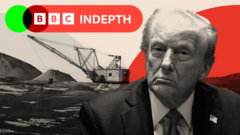Recent developments show that Trump's renewed interest in critical minerals might influence the U.S. green technology market, amid rising global demand and shifting geopolitical challenges.
Trump's New Minerals Strategy: A Twist in the Climate Debate

Trump's New Minerals Strategy: A Twist in the Climate Debate
The former President's focus on critical minerals could reshape the U.S. green tech landscape amidst a climate crisis.
In a surprising turn, Donald Trump's administration is pivoting towards critical mineral procurement, a shift that could have lasting implications for the U.S. green technology sector, even as his environmental past casts long shadows. Following his reinstatement as President, Trump has reignited discussions over the country's dependency on imports for essential minerals needed in various industries, particularly clean energy and electric vehicles.
Experts like Christiana Figueres, former UN climate chief, have criticized Trump's return as a setback for global climate initiatives, especially after he previously withdrew the U.S. from the Paris Climate Agreement. However, his keen push to secure deals with international partners such as Ukraine could unlock potential advantages for the American green technology market.
The U.S. faces an uphill battle against China's dominance in the critical minerals market, especially as demand for lithium—a key element in EV battery production—soared by 30% this year. The risks posed by relying heavily on China for essential minerals were highlighted in a recent U.S. Government Select Committee report, urging a reevaluation of America’s supply chain strategy in the context of national security.
Industry insiders suggest that Trump's interest in securing mineral resources could inadvertently foster developments in green technology, as businesses like Tesla rely on these crucial materials for electric vehicles. The potential for a "Critical Minerals Executive Order" has been floated, which could streamline mining permit processes and elevate investment in U.S. mineral procurement.
Despite these ambitions, experts warn that building a robust mining infrastructure is a complicated and time-intensive process. With challenges still ahead, many question if the U.S. can capitalize on this opportunistic pivot before other nations solidify their positions in the green tech sector.
The previous administration's aggressive support for green technology initiatives, such as the Inflation Reduction Act, has led to substantial investments, wielding importance in crafting a long-term sustainable strategy. The inherent need to collaborate on critical mineral policies may become essential, especially as Trump’s evolving stance hints at a blend of climate action potential through economic motivations.
As the global landscape shifts, the multifaceted role of critical minerals in both national security and clean technology innovation makes this a pivotal moment for U.S. policy. While Trump’s intentions may lean towards economic advancement, the intersection of these interests with environmental concerns will undoubtedly influence the nation's trajectory in the quest for a sustainable future. The challenge lies in navigating this transition while addressing the broader implications for climate resilience and international cooperation.
Experts like Christiana Figueres, former UN climate chief, have criticized Trump's return as a setback for global climate initiatives, especially after he previously withdrew the U.S. from the Paris Climate Agreement. However, his keen push to secure deals with international partners such as Ukraine could unlock potential advantages for the American green technology market.
The U.S. faces an uphill battle against China's dominance in the critical minerals market, especially as demand for lithium—a key element in EV battery production—soared by 30% this year. The risks posed by relying heavily on China for essential minerals were highlighted in a recent U.S. Government Select Committee report, urging a reevaluation of America’s supply chain strategy in the context of national security.
Industry insiders suggest that Trump's interest in securing mineral resources could inadvertently foster developments in green technology, as businesses like Tesla rely on these crucial materials for electric vehicles. The potential for a "Critical Minerals Executive Order" has been floated, which could streamline mining permit processes and elevate investment in U.S. mineral procurement.
Despite these ambitions, experts warn that building a robust mining infrastructure is a complicated and time-intensive process. With challenges still ahead, many question if the U.S. can capitalize on this opportunistic pivot before other nations solidify their positions in the green tech sector.
The previous administration's aggressive support for green technology initiatives, such as the Inflation Reduction Act, has led to substantial investments, wielding importance in crafting a long-term sustainable strategy. The inherent need to collaborate on critical mineral policies may become essential, especially as Trump’s evolving stance hints at a blend of climate action potential through economic motivations.
As the global landscape shifts, the multifaceted role of critical minerals in both national security and clean technology innovation makes this a pivotal moment for U.S. policy. While Trump’s intentions may lean towards economic advancement, the intersection of these interests with environmental concerns will undoubtedly influence the nation's trajectory in the quest for a sustainable future. The challenge lies in navigating this transition while addressing the broader implications for climate resilience and international cooperation.




















